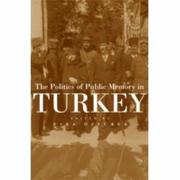| Listing 1 - 10 of 14 | << page >> |
Sort by
|

ISBN: 9780815631316 0815631316 Year: 2007 Publisher: Syracuse, N.Y. Syracuse University Press
Abstract | Keywords | Export | Availability | Bookmark
 Loading...
Loading...Choose an application
- Reference Manager
- EndNote
- RefWorks (Direct export to RefWorks)
Collective memory --- Turkey --- History. --- History as a science --- Sociology of culture --- Collective remembrance --- Common memory --- Cultural memory --- Emblematic memory --- Historical memory --- National memory --- Public memory --- Social memory --- Memory --- Social psychology --- Group identity --- National characteristics

ISBN: 0814337430 9780814337431 9780814333297 081433329X Year: 2007 Publisher: Detroit Wayne State University Press
Abstract | Keywords | Export | Availability | Bookmark
 Loading...
Loading...Choose an application
- Reference Manager
- EndNote
- RefWorks (Direct export to RefWorks)
During Hitler's reign, Nazis deliberately developed and exploited a youthful image and used youth to define their political and social hierarchies. This title analyzes a variety of media, including literature, news media, and films, in order to argue that youth and education played a central role in Germany's coming to terms with the Nazi past.
Collective memory --- Reconstruction (1939-1951) --- Youth movements --- Youth --- Collective remembrance --- Common memory --- Cultural memory --- Emblematic memory --- Historical memory --- National memory --- Public memory --- Social memory --- Memory --- Social psychology --- Group identity --- National characteristics --- History --- Germany --- Social conditions

ISBN: 9781845452841 1845452844 Year: 2007 Volume: 3 Publisher: New York, N.Y. Berghahn
Abstract | Keywords | Export | Availability | Bookmark
 Loading...
Loading...Choose an application
- Reference Manager
- EndNote
- RefWorks (Direct export to RefWorks)
"Despite the growing interest in general European history, the European dimension is surprisingly absent from the writing of contemporary history. In most countries, the historiography on the 20th century continues to be dominated by national perspectives. Although there is cross-national work on specific topics such as occupation or resistance, transnational conceptions and narratives of contemporary European history have yet to be worked out. This volume focuses on the development of a shared conception of recent European history that will be required as an underpinning for further economic and political integration so as to make lasting cooperation on the old continent possible. It tries to overcome the traditional national framing that ironically persists just at a time when organized efforts to transform Europe from an object of debate to an actual subject have some chance of succeeding in making it into a polity in its own right."
History --- European cooperation --- Collective memory --- Philosophy --- Europe --- History of Europe --- anno 1900-1999 --- Collective remembrance --- Common memory --- Cultural memory --- Emblematic memory --- Historical memory --- National memory --- Public memory --- Social memory --- Memory --- Social psychology --- Group identity --- National characteristics --- Council of Europe countries --- Eastern Hemisphere --- Eurasia --- History - Philosophy - Congresses --- European cooperation - Congresses --- Collective memory - Europe - Congresses --- Europe - History - 20th century - Congresses
Book
ISBN: 1306796490 3486706314 3486580876 Year: 2007 Publisher: De Gruyter
Abstract | Keywords | Export | Availability | Bookmark
 Loading...
Loading...Choose an application
- Reference Manager
- EndNote
- RefWorks (Direct export to RefWorks)
Hat die Vertreibung von Millionen Deutschen aus Ostmitteleuropa nach 1945 in der Erinnerungskultur der Bundesrepublik einen angemessenen Platz gefunden? Manfred Kittel zeigt, dass Differenzierungen notwendig sind: In den 1960er Jahren zeichnete sich mit wachsender Kritik an der ostpolitischen Haltung der Landsmannschaften in Medien und intellektuellen Milieus eine zunehmende Entfremdung vom historischen deutschen Osten ab. Da aber noch alle Parteien um die Wählerstimmen der Vertriebenen rangen, blieb der erinnerungskulturelle Wandel begrenzt. Erst nach dem "Machtwechsel" in Bonn 1969 mehrten sich in Bund, Ländern und Kommunen die Symptome der Verdrängung.
Population transfers --- Germans --- Collective memory --- History --- Historiography. --- Collective remembrance --- Common memory --- Cultural memory --- Emblematic memory --- Historical memory --- National memory --- Public memory --- Social memory --- Memory --- Social psychology --- Group identity --- National characteristics --- Ethnology --- Cleansing, Ethnic --- Ethnic cleansing --- Ethnic purification --- Exchange of population --- Exchanges, Population --- Interchange of population --- Interchanges, Population --- Population exchanges --- Population interchanges --- Purification, Ethnic --- Transfer of population --- Transfers, Population --- Emigration and immigration --- Minorities
Book
ISBN: 1282334069 9786612334061 1443811467 9781443811460 9781282334069 6612334061 Year: 2007 Publisher: Newcastle, U.K. : Cambridge Scholars Pub.,
Abstract | Keywords | Export | Availability | Bookmark
 Loading...
Loading...Choose an application
- Reference Manager
- EndNote
- RefWorks (Direct export to RefWorks)
Community Informatics is a developing field which brings together understandings about the interaction of communities and information and communication technologies from fields as diverse as Management and Information Systems, Library and Information Sciences, Community Development, Sociology, or Social and Community Welfare. A key assumption of community informatics is that technologies can be used for positive social change and development, particularly Other disadvantaged communities or ...
Community information services. --- Collective memory. --- Social epistemology. --- Epistemology, Social --- Knowledge, Theory of --- Social role --- Knowledge, Sociology of --- Collective remembrance --- Common memory --- Cultural memory --- Emblematic memory --- Historical memory --- National memory --- Public memory --- Social memory --- Memory --- Social psychology --- Group identity --- National characteristics --- Information services

ISBN: 9780521864954 052186495X 9780511511905 9780521145718 0511511906 9780511355714 0511355718 0511354673 9780511354670 1281153494 9781281153494 0521145716 110717855X 9786611153496 1139132083 051135519X 0511354096 Year: 2007 Publisher: Cambridge Cambridge University Press
Abstract | Keywords | Export | Availability | Bookmark
 Loading...
Loading...Choose an application
- Reference Manager
- EndNote
- RefWorks (Direct export to RefWorks)
This 2007 book analyzes how West German intellectuals debated the Nazi past and democratic future of their country. Rather than proceeding event by event, it highlights the underlying issues at stake: the question of a stigmatized nation and the polarized reactions to it that structured German discussion and memory of the Nazi past. Paying close attention to the generation of German intellectuals born during the Weimar Republic - the forty-fivers - this book traces the drama of sixty years of bitter public struggle about the meaning of the past: did the Holocaust forever stain German identity so that Germans could never again enjoy their national emotions like other nationalities? Or were Germans unfairly singled out for the crimes of their ancestors? By explaining how the perceived pollution of family and national life affected German intellectuals, the book shows that public debates cannot be isolated from the political emotions of the intelligentsia.
History of Germany and Austria --- anno 1940-1949 --- anno 1930-1939 --- Collective memory --- Intellectuals --- National characteristics, German. --- National socialism --- Attitudes. --- Psychological aspects. --- Germany --- History --- National characteristics, German --- German national characteristics --- Intelligentsia --- Collective remembrance --- Common memory --- Cultural memory --- Emblematic memory --- Historical memory --- National memory --- Public memory --- Social memory --- Attitudes --- Psychological aspects --- Third Reich, 1933-1945 --- Persons --- Social classes --- Specialists --- Memory --- Social psychology --- Group identity --- National characteristics --- Arts and Humanities
Book
ISBN: 9782204080811 2204080811 2204080810 Year: 2007 Publisher: Paris Cerf
Abstract | Keywords | Export | Availability | Bookmark
 Loading...
Loading...Choose an application
- Reference Manager
- EndNote
- RefWorks (Direct export to RefWorks)
Philosophy and psychology of culture --- Religious studies --- 216 --- Goed en kwaad --- Conferences - Meetings --- Collective memory --- Good and evil --- Memory --- Theology --- Retention (Psychology) --- Intellect --- Psychology --- Thought and thinking --- Comprehension --- Executive functions (Neuropsychology) --- Mnemonics --- Perseveration (Psychology) --- Reproduction (Psychology) --- Collective remembrance --- Common memory --- Cultural memory --- Emblematic memory --- Historical memory --- National memory --- Public memory --- Social memory --- Social psychology --- Group identity --- National characteristics --- Social aspects --- Memory - Interdisciplinary Studies - Religion, Cultural Sociology, Philosophy, Literature, History. --- History --- Religious aspects --- Political aspects --- Christianity

ISBN: 9780415956826 041595682X 9780415956833 9780203941478 9781135909819 9781135909765 9781135909802 Year: 2007 Publisher: New York Routledge
Abstract | Keywords | Export | Availability | Bookmark
 Loading...
Loading...Choose an application
- Reference Manager
- EndNote
- RefWorks (Direct export to RefWorks)
Collective memory. --- Regret. --- Political atrocities. --- Mémoire collective --- Regret --- Atrocités politiques --- #SBIB:39A11 --- 866 Herdenking en herinnering --- 316.4.052 --- Atrocities --- Emotions --- Collective remembrance --- Common memory --- Cultural memory --- Emblematic memory --- Historical memory --- National memory --- Public memory --- Social memory --- Memory --- Social psychology --- Group identity --- National characteristics --- Antropologie : socio-politieke structuren en relaties --- Integrerende processen. Sociale controle. Sociale sancties --- 316.4.052 Integrerende processen. Sociale controle. Sociale sancties --- Mémoire collective --- Atrocités politiques --- Collective memory --- Political atrocities --- History as a science

ISBN: 9780754670018 0754670015 9781315615103 9781317037019 9781317037026 9781138254152 Year: 2007 Publisher: Aldershot Ashgate
Abstract | Keywords | Export | Availability | Bookmark
 Loading...
Loading...Choose an application
- Reference Manager
- EndNote
- RefWorks (Direct export to RefWorks)
This work deals with the crime of genocide and with the social and collective memory of this crime. The volume shows that genocide fails to be adequately remembered due to the inherent defects of the law of genocide itself. The book thus links the social phenomenon to the legal theory (the legal norms) as well as to the legal practice (the trials).
Genocide. --- Genocide --- Crimes against humanity. --- Jus cogens (International law) --- Génocide --- Crimes contre l'humanité --- Jus cogens --- Psychological aspects. --- Aspect psychologique --- Crimes against humanity --- Psychological aspects --- Jus cogens (International law). --- Collective memory --- Law, Politics & Government --- Law, General & Comparative --- Collective memory. --- Génocide --- Crimes contre l'humanité --- Ius cogens (International law) --- Peremptory norms (International law) --- International law --- Customary law, International --- Cleansing, Ethnic --- Ethnic cleansing --- Ethnic purification --- Ethnocide --- Purification, Ethnic --- Crime --- International crimes --- War crimes --- Collective remembrance --- Common memory --- Cultural memory --- Emblematic memory --- Historical memory --- National memory --- Public memory --- Social memory --- Memory --- Social psychology --- Group identity --- National characteristics --- Genocide - Psychological aspects

ISBN: 0231135785 9780231135788 0231135793 9780231135795 0231509707 Year: 2007 Publisher: New York, N.Y. Columbia University Press
Abstract | Keywords | Export | Availability | Bookmark
 Loading...
Loading...Choose an application
- Reference Manager
- EndNote
- RefWorks (Direct export to RefWorks)
Israel-Arab War, 1948-1949 --- Refugees, Palestinian Arab --- Disasters --- Collective memory --- #SBIB:95G --- #SBIB:328H512 --- #SBIB:39A77 --- Palestinian Arab refugees --- Arab-Israel War, 1948-1949 --- Jewish-Arab War, 1948-1949 --- Palestine War, 1948-1949 --- Arab-Israeli conflict --- Collective remembrance --- Common memory --- Cultural memory --- Emblematic memory --- Historical memory --- National memory --- Public memory --- Social memory --- Memory --- Social psychology --- Group identity --- National characteristics --- Historiography. --- Influence. --- Atrocities. --- Psychological aspects. --- Geschiedenis van Azië (inclusief Arabische wereld, Nabije Oosten) --- Instellingen en beleid: Midden-Oosten / landen in het Midden-Oosten --- Etnografie: Noord-Afrika en het Midden-Oosten --- Collection memory --- History of Asia --- History as a science --- anno 1940-1949 --- Israel --- Palestine --- Psychological aspects --- Atrocities --- Historiography --- Influence
| Listing 1 - 10 of 14 | << page >> |
Sort by
|

 Search
Search Feedback
Feedback About UniCat
About UniCat  Help
Help News
News